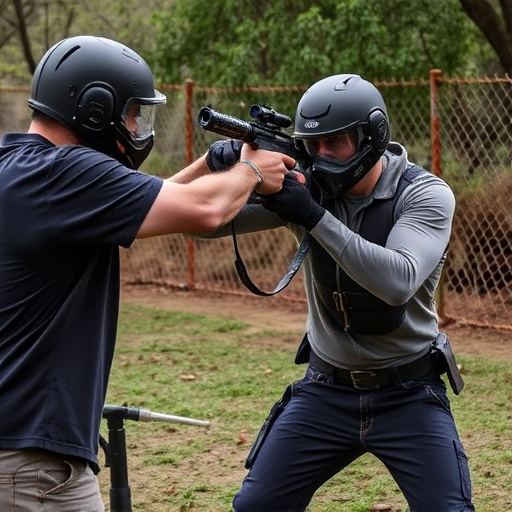Stun guns, while marketed as self-defense tools, pose significant risks to individuals with pre-existing heart conditions due to their electrical current disrupting muscle function and potentially triggering cardiac events like arrhythmias or fibrillation. Higher voltage settings increase risk, especially for users with irregular heartbeats or conditions such as cardiomyopathy. Heart patients considering a stun gun should use lower voltage settings, consult healthcare providers before use, and undergo regular check-ups to ensure safety and mitigate potential adverse effects.
“Stun guns, designed for personal protection, operate by delivering an electric shock to incapacitate assailants. However, their usage poses unique risks for individuals with cardiovascular conditions due to potential heart impact. This article delves into the safety concerns surrounding stun guns, specifically focusing on voltage ranges and their effects on cardiac patients. We explore the balance between self-defense and health risks, offering insights into precautions needed when considering stun gun use in light of pre-existing heart issues.”
- Understanding Stun Gun Functionality and Its Impact on Cardiac Patients
- Heart Health Risks Associated with Stun Gun Shock Levels
- Safety Precautions for Using Stun Guns Around Cardiovascular Conditions
Understanding Stun Gun Functionality and Its Impact on Cardiac Patients

Stun guns, despite their name, don’t actually stun in the traditional sense. They use an electric current to disrupt muscle control, causing the target to experience a powerful muscular reaction and temporary incapacitation. Understanding how they function is crucial when considering the risks for cardiac patients. The impact of a stun gun’s electrical discharge can be particularly dangerous for individuals with pre-existing heart conditions due to the potential strain on their hearts and cardiac rhythm.
While a stun gun may not directly cause a heart attack, the intense physical response it induces can exacerbate existing issues like arrhythmia or cardiomyopathy. The sudden and forceful contractions of muscles, combined with the stress on the cardiovascular system, could lead to serious adverse effects in vulnerable patients. Therefore, it’s essential to be aware of stun gun risks for heart patients, especially in scenarios where self-defense might escalate into physical confrontations.
Heart Health Risks Associated with Stun Gun Shock Levels

Using a stun gun, even within recommended safety guidelines, can pose significant risks to individuals with pre-existing heart conditions. The electric current delivered by stun guns can potentially trigger dangerous cardiac events, such as arrhythmias or fibrillation, especially in those already susceptible to irregular heartbeat. Studies have shown that the higher the voltage output, the greater the risk for vulnerable individuals.
For heart patients considering a stun gun for personal safety, it’s crucial to understand the device’s shock level and choose one with lower voltage settings. Even within the legal limit, some stun guns can deliver jolts exceeding 1000 volts. Such high-voltage devices should be avoided by those with cardiac issues unless specifically cleared by a doctor. Regular check-ups with a healthcare provider are essential for individuals considering self-defense tools to ensure their safety and well-being.
Safety Precautions for Using Stun Guns Around Cardiovascular Conditions

Using a stun gun, like any other self-defense tool, comes with inherent risks, especially for individuals with pre-existing medical conditions. In terms of stun gun risks for heart patients, it’s crucial to understand that cardiovascular diseases can make these individuals more susceptible to adverse effects during a stun gun activation. The electric current emitted by a stun gun can potentially impact the heart’s rhythm and contraction, which is especially dangerous for those with irregular heartbeats or heart problems like arrhythmias.
As previously mentioned, stun guns deliver high voltage, which could trigger a cardiac event in sensitive cases. Therefore, individuals with known cardiovascular conditions should exercise extreme caution when considering carrying or using a stun gun. In light of the above, consulting with a healthcare provider before employing such a device is essential to ensure safety and mitigate potential risks associated with stun gun use for heart patients.
In light of the discussed Stun Gun Risks for Heart Patients, it’s clear that while stun guns offer personal safety benefits, their use around individuals with cardiovascular conditions requires extreme caution. Understanding the heart health risks associated with stun gun shock levels and implementing safety precautions is paramount. Always consult medical professionals and consider alternative non-lethal options where possible to minimize potential harm, especially for those with pre-existing heart conditions.
